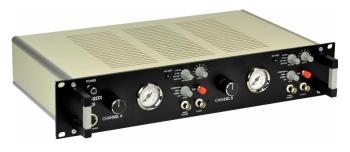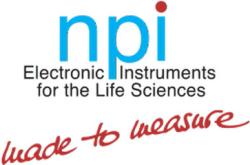/ Catalog / Microinjection and Perfusion Systems / npi PDES
PDES – Pressure Application System
npi's PDES Pneumatic Drug Ejection System serves as a device for intracellular microinjection and extracellular dispensing of liquids within the picoliter and nanoliter range.
- Overview
- Specifications
- Links
Advantages of the PDES
- Utilize ionic and non-ionic substances in minimal quantities
- Precise local application with the microJECT – a pipette holder featuring an integrated valve
- The fastest pressure application system on the market
- Also applicable for whisker stimulation in rodents
- Simpler models available for larger volumes (bulk loading)
- Can be integrated as a module for the EPMS-07 system
Pressure Ejection System
The PDES Pneumatic Drug Ejection System serves as a device for intracellular microinjection and extracellular dispensing of liquids within the picoliter and nanoliter range. This type of equipment is commonly referred to as a “Picospritzer”
Pressure ejection offers a practical approach for administering both ionic and non-ionic solutions from micropipettes. Firstly, it is applicable to nearly all solutions. Secondly, the volume of the ejected solution can be observed by examining the tip of the micropipette under a microscope. npi PDES units are specifically designed for the pressure ejection of drugs in physiological and pharmacological research. PDES systems are equipped with pressure outputs (Pmax = 4 bar (58 psi) or 2 bar (29 psi)) for drug application using micropipettes. Digital timers and a remote control unit enhance the usability of these instruments. They are available with either one or two application channels. Instruments with a single channel can also be fitted with a retain channel. All PDES units can function with internal valves as well as external valves, allowing the minimum application time to be reduced to less than one millisecond.
Each channel is composed of a precision pressure regulator, a pressure display, electronically controlled valves, control electronics, and a regulated power supply. The ejection of drugs can be initiated either manually or via a TTL input. The operational status is signaled by a red/green LED. Each system includes a monitor BNC connector that indicates the opening time of the pressure valve. In digital systems, the pressure is also monitored at a BNC connector (1 V/bar or 0.1 V/psi).
Features
- High pressure output suitable for fine-tipped micropipettes
- Low-range pressure output designed for large-tipped pipettes
- Digital timer
- Analog or digital manometers
- Remote control option available
- Available in one or two channel versions (one channel versions can be upgraded)
- External valves for rapid applications available (2 ms and longer)
- System with holding pressure option available
Special - PDES with HOLD Pressure
In the PDES-DXH model, the second channel is substituted with a HOLD channel. This feature enables the application of a small hold pressure between application pulses. The hold pressure counteracts the capillary forces that would otherwise cause the bath solution to enter the pipette.

There are infrequent instances where a vacuum must be utilized to prevent the application liquid from escaping the pipette. A highly effective method to achieve this is through the use of ALA’s 2PK+ pressure/vacuum controller.
You can also visit site of the manufacturer.


